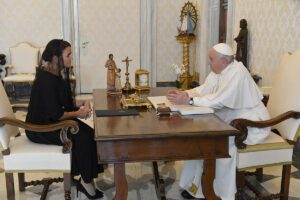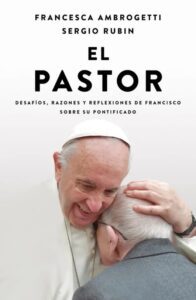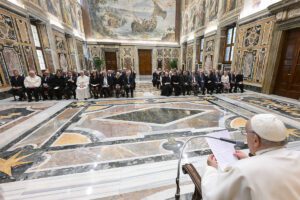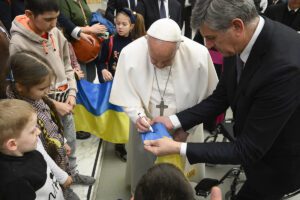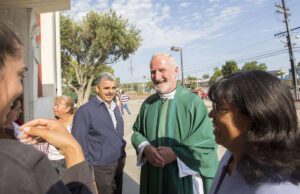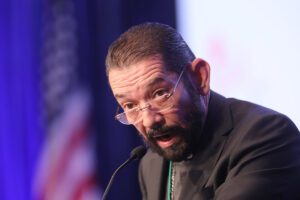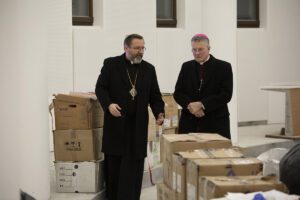WASHINGTON (OSV News) – The recently formed Institute on the Catechism will carry out the U.S. bishops’ vision of the importance of “connecting evangelization and catechesis,” according to Father Daniel J. Mahan, an Indianapolis archdiocesan priest just named as the institute’s director.
The institute is housed within the Secretariat for Evangelization and Catechesis at the U.S. Conference of Catholic Bishops’ headquarters in Washington.
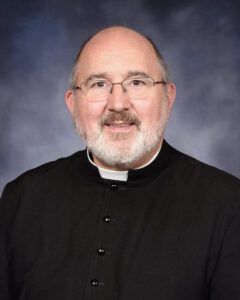
Father Michael J.K. Fuller, USCCB general secretary, appointed Father Mahan Feb. 27 to the post, effective July 1.
This “evangelizing catechesis,” a focus of the church as a whole, aims to teach the beliefs of the Catholic faith in a “compelling and inviting” way to help young Catholics foster a “deeper relationship with the Lord and help them see their place within the body of Christ, the church, and in turn, reach out to others to share the Good News,” Father Mahan told OSV News.
Bishop Frank J. Caggiano of Bridgeport, Connecticut, chairman of the USCCB Subcommittee on the Catechism, which reviews catechetical texts and provides consultation to the bishops’ Committee on Evangelization and Catechesis, presented a proposal to create an Institute for the Catechism at the bishops’ spring meeting in June 2021, which was held virtually because of the pandemic.
The Institute on the Catechism was created “to reimplement and reinvigorate the mandate of the subcommittee in responding to the changing catechetical landscape,” said USCCB news release announcing Father Mahan’s appointment.
Through the institute, catechetical publishers and developers of catechetical content will work directly with the USCCB subcommittee in new ways to pass on the faith using digital tools while aiming to reach a more diverse church. The institute will help them address today’s challenges to catechesis, such as young people’s disaffiliation with organized religion, the growing secularism in society and the influences of social media.
The institute also will provide resources to dioceses and yearly, in-person training conferences and retreats for diocesan catechetical leaders.
Father Mahan has reviewed catechetical texts since the late 1990s and has worked as a core team member for the institute since its November 2022 launch. A graduate of the former St. Meinrad College in Indiana, Father Mahan holds a licentiate in sacred theology from the Pontifical Atheneum of St. Anselm in Rome.
Ordained a priest in 1988, Father Mahan has served in parishes throughout the Indianapolis Archdiocese. Currently, he serves with Father Jonathan Meyer as pastor with a team of priests serving four parishes in southern Indiana’s Dearborn County.
Bishop Caggiano said Father Mahan brings to the position “a deep understanding” of the Catechism of the Catholic Church “along with the invaluable, longtime expertise of teaching it to the faithful in a meaningful way.”
“At a time when there is wide-spread disaffiliation with the faith, and yet a deep desire and hunger being expressed by many to fill the void in their lives, we must take new, bold approaches to help the bishops to equip their catechists with ways to invite people to an encounter with the Lord,” the bishop said in a Feb. 27 statement about the priest’s appointment.
Bishop Caggiano thanked Indianapolis Archbishop Charles C. Thompson “for allowing Father Mahan to serve the greater church with the unique talents he brings to the institute.”
“Evangelizing catechesis” draws inspiration from Pope Francis’ 2021 document “Antiquum Ministerium” (“Ancient Ministry”) that described catechesis as an official church ministry. It also builds on the Vatican’s Directory for Catechesis, issued in 2020, that gives guidelines for catechists and pastors, particularly in the role of evangelization.
The institute launched its inaugural meeting Nov. 10-12, 2022, in Baltimore ahead of the U.S. bishops’ Nov. 14-17 general assembly.
Father Mahan told OSV News the gathering drew over 130 church leaders, including bishops, other diocesan officials, staff of the USCCB subcommittee, priests and others currently helping review catechetical texts as well as representatives from various publishers of catechetical materials.
He called it a “beautiful opportunity” for all involved in catechesis “to be together. We are in this together. The institute is meant to keep us together and help us work together for the same goal — to form young people in the faith, help them live the faith for a lifetime.”
“We know we have a lot of young Catholics who are leaving the church, some at a very early age. Some kids will make that decision in middle school … opting out even if they are still going to Mass and religious ed. They’re already out the door,” he said.
The bishops want to make sure “we’re doing the best we can in catechesis” and help those called in that direction “to produce high quality, doctrinally sound, compelling materials for our young people that grab them by the heart.”
He paid tribute to the late Indianapolis Archbishop Daniel M. Buechlein for playing a significant role in the renewal of catechesis in the U.S. while he was chairman of the U.S. bishops’ Ad Hoc Committee on the Use of the Catechism of the Catholic Church.
In spite of the great efforts by catechists and publishers of catechetical materials to date, “we are still losing young people,” Father Mahan said, due in part to the many “powerful influences in our culture that are sort of like tentacles that can wrap around and not let go.”
The “‘isms’ are rampant — individualism, materialisms, narcissism that leads to nihilism,” Father Mahan told OSV news. “When we look at how saturated many young people are in media — whether watching TV, music, movies, engrossed in social media — there are a lot of influences that mitigate against a solid formation in the faith.”
“I’m not sure we can do a whole lot to change what’s out there. That may be someone else’s calling,” he said. “But the church can make sure what we are offering is top-notch, innovative … We know we are one screen away from anyone else in the world and that can present some great opportunities for us in using media in ways that glorify God.”

